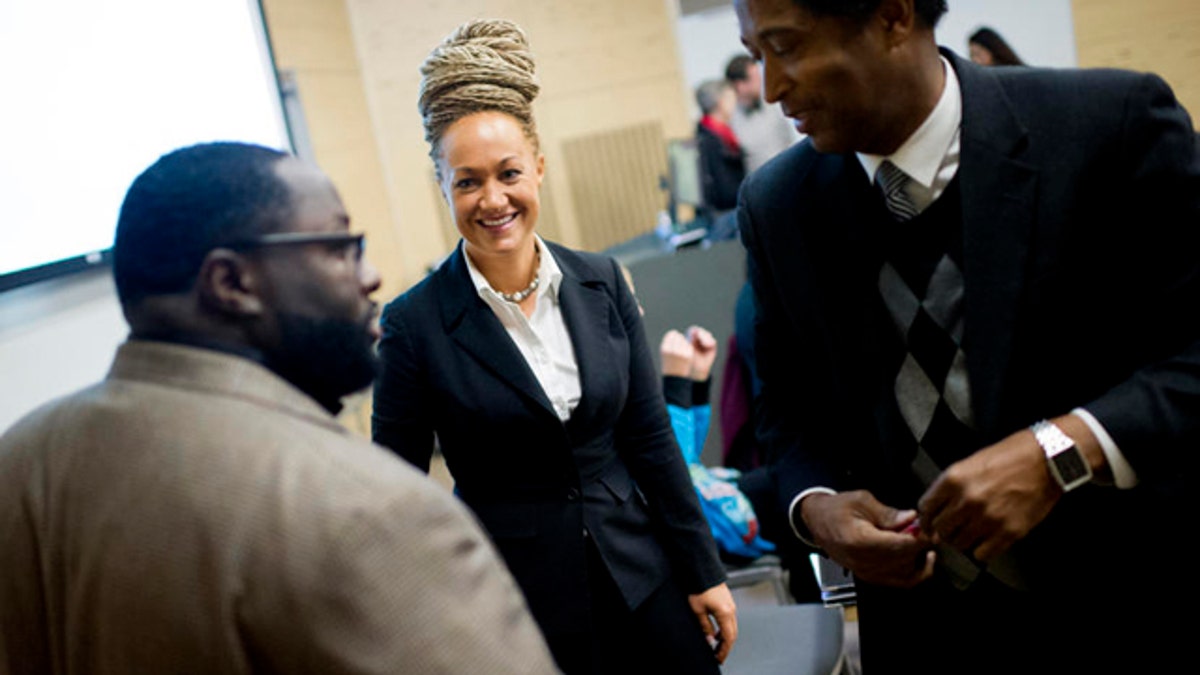
FILE- In this Friday, Jan. 16, 2015 file photo, Rachel Dolezal, Spokane's newly elected NAACP President, smiles as she meets with Joseph M. King of King's Consulting, left, and Dr. Scott Finnie, director and senior professor of EWU's Africana Education Program before the start of a Black Lives Matter Teach-In on Public Safety and Criminal Justice at EWU in Cheney, Wash. (Tyler Tjomsland/The Spokesman-Review via AP, File) COEUR D'ALENE PRESS OUT
Rachel Dolezal, the former head of the Spokane NAACP, has insisted she is black, despite having white parents. She has been quoted as saying, "That question is not as easy as it seems. There's a lot of complexities ... and I don't know that everyone would understand that."
I do understand. Years ago, even before Sen. Elizabeth Warren was exposed for identifying herself as Native American (which she is not), I believe I was the first person in the world to assert that transgender activism by Chaz Bono (and now by Caitlyn Jenner) could sow the seeds for people not only to assert their core gender identities, despite DNA evidence to the contrary, but also to assert their racial identities, despite physical and historical evidence to the contrary. If a man with male anatomy and a “Y” chromosome can assert he is female and be put on the covers of celebrity magazines and given awards for bravery, why can’t a white woman assert that her internal identity is that of a black woman?
If a blond man with Scandinavian roots visits Japan and feels a gripping sense of belonging, such that he is certain he is among his own people, why can’t that man return to America, dye his hair, have facial surgery and be accepted as an Asian-American?
Why does factual history have to dictate current reality if a human being feels very deeply that that factual history is not in tune with his or her inner sense of self?
We are rushing into this philosophical and psychological landscape with almost no consideration of its implications.
I mean the question sincerely, because we are rushing into this philosophical and psychological landscape with almost no consideration of its implications. And I am not taking sides with either transgender advocates or those who oppose them. Let others consider the implications of the transgender movement for our collective grip on reality, as a culture and as a species.
I am merely stating what seems obvious to me. If our measure of what a person is must be no more and no less than what she feels she is, then Rachel Dolezal can be black, if she wants to be, and if she can show evidence that she has sincerely adopted that vision of herself. And Elizabeth Warren can be a Native American. To do otherwise would be to stigmatize them for their “racial identity,” in the same way that Caitlyn Jenner would object to being stigmatized for Caitlyn’s “gender identity.”
Racial identity need not be the end of this, by the way. Here’s one to ponder: If a man feels, to the core of his being, that he is 65 when he is chronologically 35, and if he can show evidence that he has voiced this self-concept, repeatedly, and has objected vigorously to being treated as though he is 35, who are we to lace him to his actual date of birth? Why not let him choose another that feels “right”? And if he applies for Medicare, why should he be denied? Isn’t that discriminating against him based on his age identity?
You may think this is ridiculous (and I might), but a leading attorney with whom I have consulted has suggested that the case of such a man would not be without some merit, given the case law regarding transgender individuals.
As my artist friend Lincoln Agner puts it, “When we cross enough boundaries, millions of people can end up playing air guitar.”
I have warned and warned and warned that breaking free of certain apparent realities that define us as human beings – genetically and historically – can have profound implications for how closely people remain tied to reality, in general. Let us see how far down this path of “self”-assertion we travel, and with what results.
